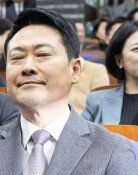Direct Election of Kookmin Bank Chief
Direct Election of Kookmin Bank Chief
Posted July. 22, 2010 11:09,
KB Financial Group mailed a survey to 1,300 of some 26,000 staff of its flagship subsidiary Kookmin Bank. The survey asked who should be the banks next president. Of the 12 candidates recommended in the survey forms collected through Wednesday, KB will narrow the list to three before making the final selection through interviews by its board of directors.
The survey will likely cause major aftereffects though the groups new chairman Euh Yoon-dae, an outsider who knows little about the banks organization, used this method with the innocent intent of gauging the opinions of bank staff. Fears are mounting that latent conflict and enmity lurking within the bank between staff from Kookmin Bank and those of the now-defunct Korea Housing Bank and Korea Long-Term Credit Bank will resurface in the wake of the popular vote for candidates for Kookmin president.
Bank staff were reportedly scrambling over the weekend over their choice of candidates for Kookmin president. They formed factions based on their affiliations before the merger of the three banks and the high schools and colleges they graduated from. Such an outdated practice is a far cry from the envisioned advancement of the Korean financial industry. The method of gathering recommendations through a public poll to make a shortlist is feared to spread political populism throughout financial institutions and help increase the influence of labor unions.
By opting for a method that entails the side effects of the direct voting system for university presidents, Euh effectively put his right to personnel management on shaky ground. He could choose among the top three candidates, but if he shuns the candidate topping the internal poll, another crisis could erupt.
Will Euh keep asking for the unions opinion whenever he conducts a personnel reshuffle? Whether a bank president named through such a method can lead based on his own beliefs and judgment is debatable. Kookmin lags behind its rivals in productivity given its staff size and requires intensive restructuring. If the KB Financial Group chairman, who must display strong leadership to conduct restructuring, ends up too mindful of the opinions of the union and staff, he can hardly be expected to implement proper restructuring.
While serving as president of Korea University, Euh is said to have elevated the status of the private university. He failed to win reelection, however, because he was excluded in a quasi-popular vote of professors dubbed a disqualification vote. As such, he should be well aware of the ill effects of a direct voting system for university president. Why he seeks to transplant a system to a bank that has failed at universities is questionable.
Irrespective of who becomes Kookmin president, resolving the serious aftereffects from the direct vote is a pressing issue requiring an urgent resolution. Such a system should also not spread to other financial institutions.







